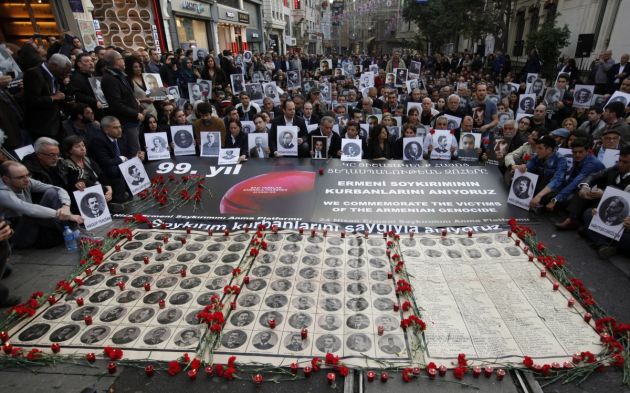Armenian leader says Ankara denies 'genocide' but Turks not enemy

YEREVAN (Reuters) - Armenian President Serzh Sarksyan accused Turkey of "utter denial" of what Armenia sees as the genocide of Armenians by the Ottoman Empire 99 years ago, but said his country does not consider Turks its enemy.
Sarksyan's website posted on Wednesday the remarks he was to deliver on Thursday. They appeared the same day Turkey's leader offered what his government said were unprecedented condolences to descendants of Armenians killed by Ottoman soldiers.
Deep disagreement about what happened in 1915 continues to poison relations between Muslim Turkey and Christian Armenia. Turkey closed its border with Armenia in 1993 and reconciliation efforts stalled in 2010.
Turkey accepts that many Armenians died in clashes, but denies that up to 1.5 million were killed and that this was an act of genocide, a term used by many Western historians and foreign parliaments.
The "Armenian Genocide ... is alive as far as the successor of the Ottoman Turkey continues its policy of utter denial," Sarksyan said in an address to be delivered on Remembrance Day on Thursday, according to an English translation on the site.
"We are convinced that the denial of a crime constitutes the direct continuation of that very crime. Only recognition and condemnation can prevent the repetition of such crimes in the future," he said, calling on Turkey to "repent."
TURKS NOT THE ENEMY
Turkish Prime Minister Recep Tayyip Erdogan did none of those things in his statement, but he unexpectedly described the events of 1915 as "inhumane" and expressed condolences to the grandchildren of the dead, in what Turkish government officials said was a historic step.
Sarksyan did not mention Erdogan's remarks in the address and made clear Armenia believes it is up to Turkey to "set aside the historical stigma" and "set free their state's future from this heavy burden."
"At the same time, I publicly reaffirm: we do not consider the Turkish society as our enemy," he said. "Bowing to the memory of the innocent victims we remember all those Turks, Turkish families who lent a helping hand to their Armenian neighbours."
"God bless the memories of those who gave plenty of our compatriots a helping hand by risking even their and their families' lives," he said, according to the text posted on the presidential website.
No one from Sarksyan's office or the Armenian government was immediately available to comment.
Turkey cut ties and shut its border with Armenia in 1993 in support of Turkic-speaking Azerbaijan, which was then fighting a losing war against ethnic Armenians separatists for control of the Nagorno-Karabakh region.
The frontier remains closed and international efforts to resolve the dispute over Nagorno-Karabakh have been unsuccessful since a 1994 ceasefire, raising the persistent prospect that a new war could break out.
Last December, Turkish Foreign Minister Ahmet Davutoglu made Turkey's first high-level visit to Armenia in nearly five years, raising the prospect of a revival in peace efforts between the historical rivals which stalled in 2010.
(Writing by Steve Gutterman; Editing by Tom Heneghan)
